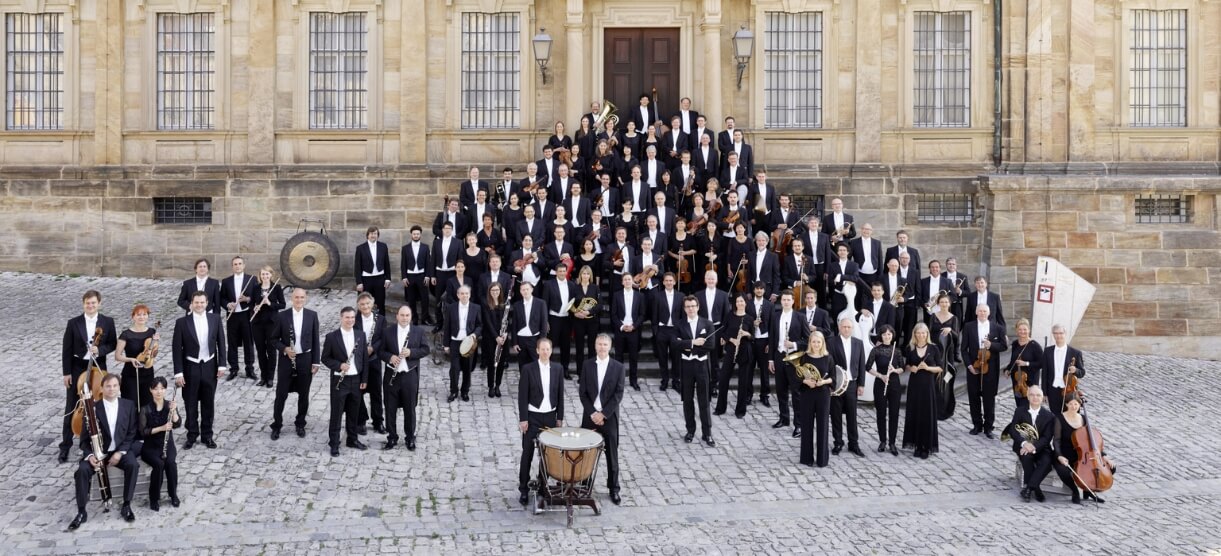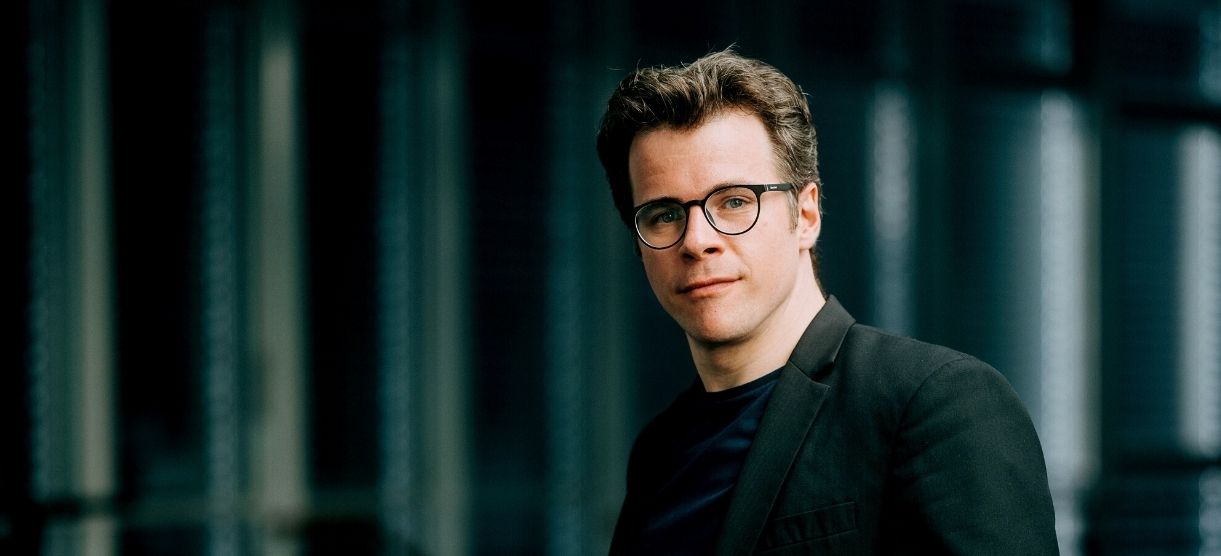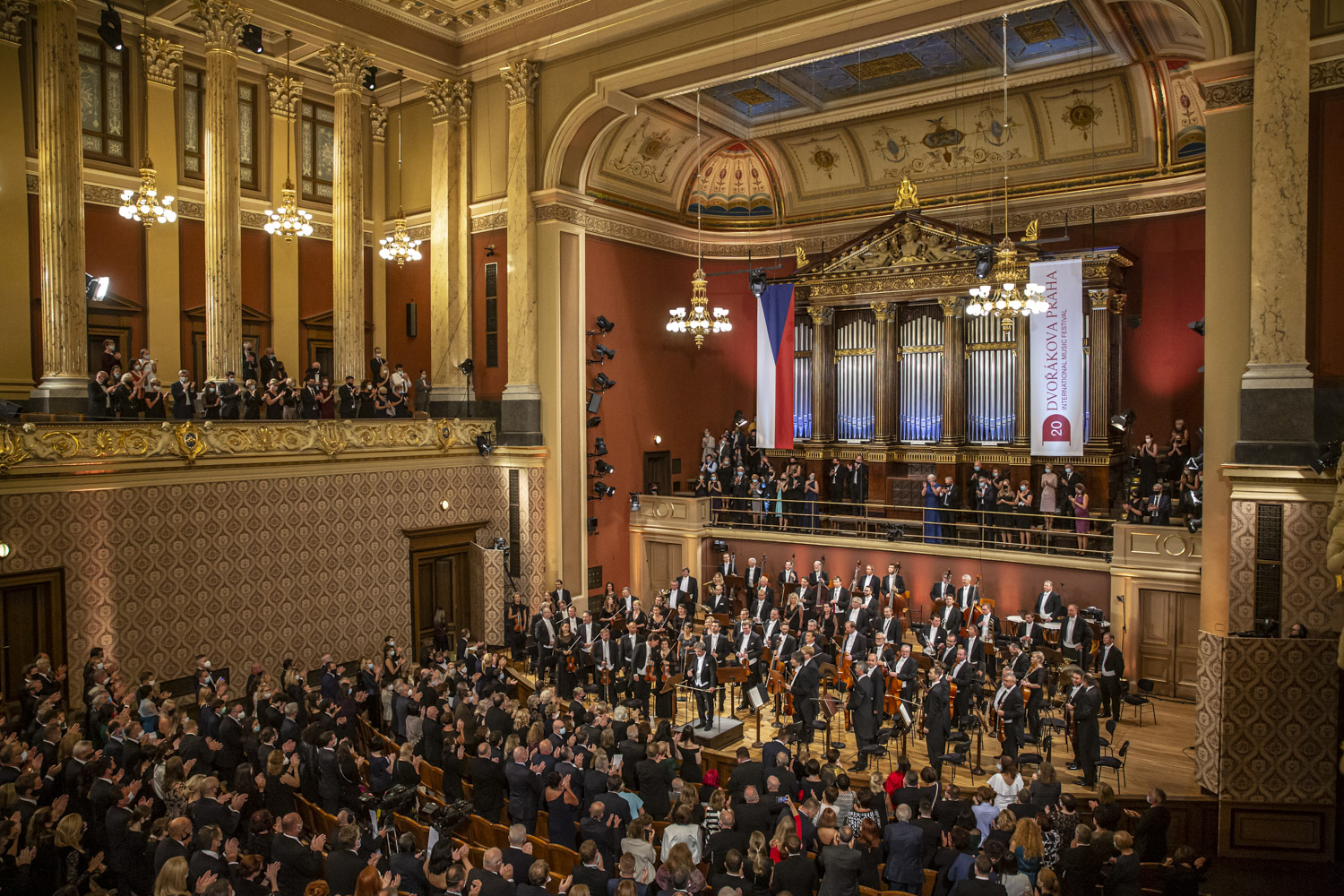
Gustav Mahler: Adagietto from Symphony No. 5
Richard Strauss: Four Last Songs, Op. posth.
Josef Bohuslav Foerster: Symphony No. 4 in C Minor, Op. 54, ‘Easter Eve’
In a letter to Richard Strauss, Gustav Mahler wrote that they were like two workers digging a tunnel under the same mountain, each beginning on the opposite side but sure to meet in the middle. A musical encounter of these composers at the festival will be accompanied by a rare and unjustly neglected guest – Josef Bohuslav Foerster, a Czech composer and a creative colleague of the two musical giants. This Austro-German-Czech encounter is being presented by the Bamberg Symphony with its chief conductor, Jakub Hrůša. It is truly symbolic that works by great musicians of Central Europe are being performed by an orchestra founded in the wake of the upheavals of post-war Europe. The players of the Bamberg Symphony were largely musicians who had been deported from Prague to Germany, and to this day, the orchestra takes pride in its “Czech sound”. Their guest appearance at the Dvořák Prague Festival is a kind of homecoming for them, and in addition they will be sharing the title of orchestra-in-residence with the Czech Philharmonic.
The graceful motion of the captivating Adagietto from Mahler’s Symphony No. 5 will be followed by the Four Last Songs by Richard Strauss. The pensive character of those two works opens the door to Josef Bohuslav Foerster’s Symphony No. 4, a musical depiction of Easter as experienced by a person of deep religious faith. The work is rightly regarded as Foerster’s masterpiece.
The Bamberg Symphony is the only orchestra of world renown that is not based in a vibrant metropolis. Almost 10% of the local population subscribe to one of the orchestra’s five concert series, in many cases for decades. However, the ‘magnetic effect’ of the orchestra resonates far and wide: the traveling orchestra has been performing its characteristically dark, sombre, and warm sounds and the musical echo of its hometown throughout the world since 1946. With almost 7,500 concerts in over 500 cities and 63 countries, they have become a cultural ambassador for Bavaria and all of Germany. They regularly tour the USA, South America, Japan, and China, for example, and are invited by renowned concert halls and festivals worldwide. The Bamberg Symphony therefore briefly describes their mission as Resonating Worldwide.
The circumstances of its founding make the Bamberg Symphony a mirror of German history: in 1946, former members of the German Philharmonic Orchestra Prague met colleagues in Bamberg who also had to flee their homeland as a result of the war and post-war turmoil. Starting with the orchestra in Prague, its lines of tradition can be traced back to the 18th and 19th centuries. Thus, the roots of the Bamberg Symphony reach back to Mahler and Mozart. Since 2004, the orchestra has held the honorary title of Bavarian State Philharmonic Orchestra, and is substantially financed by the Free State of Bavaria.
Four principal conductors, Joseph Keilberth, James Loughran, Horst Stein, and Jonathan Nott, as well as Artistic Director Eugen Jochum have led the orchestra since 1946. With Czech Jakub Hrůša, the fifth principal conductor since 2016, a bridge has again been built between the historical roots of the Bamberg Symphony and the present day, more than 75 years after the orchestra was founded. They regularly perform with their honorary conductors Herbert Blomstedt and Christoph Eschenbach, as well as with other leading conductors such as Manfred Honeck, Andris Nelsons and Lahav Shani.
A not insignificant contribution to increasing the worldwide high profile of the Bamberg Symphony is also attributed to the countless concert broadcasts in cooperation with Bavarian Radio (BR) as well as various other radio, record, and CD productions. In 2019, the orchestra broke new ground with a recording of Smetana's »Má vlast« using the direct-to-disc process, in which the recording is made directly onto a disc without digital post-processing, creating a unique sound experience. The recording of Mahler’s 4th Symphony (2020; accentus music) was awarded the Annual Prize of the German Record Critics at the end of 2021. This was followed by a recording of Anton Bruckner’s 4th Symphony in all three versions, united in one edition – a unique project to date, which won the International Classical Music Award 2022. Subsequently, the orchestra also received the ICMA 2023 for its recording of Hans Rott’s 1st Symphony (2022; Deutsche Grammophon). The Bamberg Symphony completed a cycle of four double CDs with symphonies by Brahms and Dvořák (2018-2022; TUDOR). In November 2022, two of these CDs were awarded »Recording of the Month« by BBC Music Magazine.
The fact that this group also places a great deal of emphasis on programmatic content at their concerts is attested to by the award from the German Music Publishers Association for »The Best Concert Programme« in spring 2018. In 2020, the orchestra received the Bavarian State Prize for Music. In 2021, an audio book was published (accentus music) that musically retells the unique history of the Bamberg Symphony from Mozart in Prague to the present day.
Since 2022, the Bamberg Symphony has set itself the goal of acting and travelling in a more climate-friendly manner, e.g., using means of transportation powered by alternative energy sources. For larger tours and trips abroad, efforts are being made to optimize travel routes and tour procedures. Increasingly, the orchestra stays in one country or place for longer periods, e.g., to play residencies or lead educational projects joined by local artists. By financially supporting environmental projects, including those in concert locations, the orchestra is attempting to offset most of the CO2 emissions caused by its own travels.
source: Bamberger Symphoniker

Jakub Hrůša is Chief Conductor of the Bamberg Symphony and Principal Guest Conductor of both the Czech Philharmonic and the Orchestra dell’Accademia Nazionale di Santa Cecilia. From autumn 2025, he will take up the post of Music Director at the Royal Opera at Covent Garden in London.
He frequently appears as a guest conductor with the world’s greatest orchestras, including the Berlin, Vienna, Munich and New York Philharmonics, the Bavarian Radio, NHK, Chicago and Boston Symphonies, the Leipzig Gewandhaus, Lucerne Festival, Royal Concertgebouw, Mahler Chamber and the Cleveland Orchestra, the Orchestre Philharmonique de Radio France, Dresden Staatskapelle, Orchestre de Paris, and Tonhalle Orchester Zürich.
He has led opera productions for the Vienna State Opera, the Royal Opera House, Opéra National de Paris, Zurich Opera, and the Glyndebourne Festival. In 2022, he made his debut at the Salzburg Festival with a new production of Káťa Kabanová.
For his recordings with the Bamberg Symphony, he received an ICMA for Hans Rott’s 1st Symphony in 2023, previously an ICMA for Bruckner’s 4th Symphony, as well as the Jahrespreis der Deutschen Schallplattenkritik for Mahler's 4th Symphony, as well as a BBC Music Magazine Award for Dvořák and Martinů Piano Concertos with Ivo Kahánek. In addition, he has received Gramophone and BBC Music Magazine Award nominations for Martinů Violin Concertos with Frank Peter Zimmermann.
Hrůša studied at Prague’s Academy of Performing Arts, where his teachers included Jiří Bělohlávek. He is President of the International Martinů Circle and The Dvořák Society. He was the inaugural recipient of the Sir Charles Mackerras Prize, and in 2020 was awarded the Antonín Dvořák Prize by the Czech Republic’s Academy of Classical Music, and – with the Bamberg Symphony – the Bavarian State Prize for Music. In 2023, Jakub Hrůša was awarded Honorary Membership to the Royal Academy of Music in London.
source: Bamberger Symphoniker

Kateřina Kněžíková is one of the most promising sopranos of her generation. In addition to her opera career, she increasingly focuses on concert repertoire, achieving success both in her native Czech Republic and abroad. Her core repertoire includes works by Antonín Dvořák, Bohuslav Martinů, Leoš Janáček, as well as the art song genre. She is the recipient of the Classic Prague Awards 2018 for Best Chamber Performance and the Thalia Award 2019 for her outstanding stage portrayal in Julietta or The Key to Dreams (B. Martinů) at the National Moravian-Silesian Theatre.
A graduate of the Prague Conservatory and the Academy of Performing Arts in Prague, Kněžíková has been a permanent member of the National Theatre Opera since 2006. Her current roles there include appearances in Rusalka, Così fan tutte, Carmen, Jenůfa, The Bartered Bride, and The Cunning Little Vixen.
She has performed at numerous festivals, including the Glyndebourne Opera Festival, Prague Spring International Music Festival, Dvořák Prague International Music Festival, and Smetana’s Litomyšl. Her collaborations with leading orchestras include the BBC Symphony Orchestra, Bamberg Symphony, Camerata Salzburg, Czech Philharmonic, Deutsches Symphonie-Orchester Berlin, London Philharmonic Orchestra, Mahler Chamber Orchestra, National Polish Radio Symphony Orchestra, ORF Vienna Radio Symphony Orchestra, Rotterdam Philharmonic Orchestra, Royal Liverpool Philharmonic Orchestra, Orchestre Philharmonique de Radio France, Orchestra dell’Accademia Nazionale di Santa Cecilia, Prague Radio Symphony Orchestra, Tokyo Symphony Orchestra, among others.
She has worked under the baton of many distinguished conductors, including Jiří Bělohlávek, Semyon Bychkov, Serge Baudo, Plácido Domingo, Asher Fisch, Manfred Honeck, Domingo Hindoyan, Jakub Hrůša, Oksana Lyniv, Tomáš Netopil, John Nelson, Petr Popelka, and Robin Ticciati.
In 2021, Kněžíková released her debut solo album “Phidylé” with Supraphon, which was named Editor’s Choice and listed among Gramophone's Best Classical Albums of 2021, also winning the BBC Music Magazine Award in the Vocal category. Her discography with Radioservis includes the albums “Fantasie” and “K2”. In September 2024, she released “Tag und Nacht” with Jakub Hrůša and the Bamberg Symphony under the Supraphon label.
In December 2024, she made a highly successful debut with the Czech Philharmonic at Carnegie Hall, conducted by Semyon Bychkov.
source: Agentura Camerata

The Rudolfinum is one of the most important Neo-Renaissance edifices in the Czech Republic. In its conception as a multi-purpose cultural centre it was quite unique in Europe at the time of its construction. Based on a joint design by two outstanding Czech architects, Josef Zítek and Josef Schultz, a magnificent building was erected serving for concerts, as a gallery, and as a museum. The grand opening on 7 February 1885 was attended by Crown Prince Rudolph of Austria, in whose honour the structure was named. In 1896 the very first concert of the Czech Philharmonic Orchestra took place in the Rudolfinum's main concert hall, under the baton of the composer Antonín Dvořák whose name was later bestowed on the hall.
